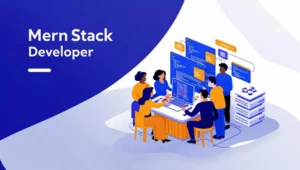
Master MongoDB, Express.js, React.js, and Node.js with live project-based training from industry experts. MERN Stack developers are in high demand—learn to build dynamic, scalable web applications with 100% practical training. Join Ducat’s Best MERN Stack Course in Delhi NCR and kickstart your career in full-stack development today
MERN Stack Developer: In today’s web development industry, the MERN Stack has proven to be a powerful development leader, allowing developers to create web applications with dynamic, interactive, and scalable features.
MERN Stack full form is MongoDB, Express.js, React.js, and Node.js. The MERN stack developer is a popular choice for building web applications. Most college students look to choose which is the best course to join for market trends and job opportunities, and questions rise in their minds, so they join the MERN stack developer course.
Is MERN stack in demand?
The Answer is “Full-stack developers are in high demand, and the MERN stack ranks as one of the most selected technological stacks for developing cutting-edge applications. A MERN stack developer is a specialist who understands how to build strong, scalable, and efficient web applications”.
Are you looking for a MERN Stack course? Then Ducat offers you the Best MERN Stack course in Delhi NCR with live project-based training. This course is 100% practical training with the best industry experts. Join our Complete MERN Stack Roadmap to Become a Full Stack Developer.
TOC
- What is MERN Stack Developer?
- What are the Components of MERN Stack?
- Skills Required Becoming a MERN Stack Developer
- MERN stack vs full stack
- Career opportunities After MERN Stack Developer Course
- Conclusion
- FAQs
What is MERN Stack Developer?
A MERN Stack developer develops and supports web applications that use MERN technologies. The MERN stack, which includes MongoDB, Express.js, React, and Node.js, is commonly used to develop robust full-stack applications. A MERN stack developer manages both front-end and back-end development, ensuring that applications run effectively.
What is Stack?
A stack is a collection of software programs or technologies working together to achieve a shared purpose, such as software development. It contains closely related software programs that may help in workflow and, as a result, the successful completion of specific tasks.
- What are the Roles and Responsibilities of a MERN Stack Developer?
- Designing and Developing Applications: Develop scalable, maintainable, high-performance web applications using tools like React, Node.js, and Express.js.
- Database Management: Set up and provide MongoDB databases, including schema design and query optimization.
- API development: It involves creating and managing RESTful APIs with Express.js.
- Front-End Development: It involves creating responsive and engaging user interfaces using React.
- Server-Side Logic: Use Node.js to implement application logic and data processing.
- Collaboration: Collaborate with other developers, designers, and stakeholders to accomplish project specifications and timelines.
What are the Components of MERN Stack?
The MERN stack is a collection of JavaScript-based technologies that work together to create web applications. It enables developers to use a single language, JavaScript, throughout the entire stack, simplifying code reuse and boosting development. The stack includes MongoDB, Express, React, and Node.js.
- MongoDB – A NoSQL database that stores data in a flexible, JSON-like format.
- Express.js – A lightweight web application framework for Node.js that simplifies backend development.
- React.js – A powerful front-end JavaScript library for building dynamic and interactive user interfaces.
- Node.js – A runtime environment that allows JavaScript to run on the server side.
MERN Stack Operations
These methods are essential for understanding MERN’s potential and efficiency when developing modern web applications.
- User Interaction: An event is generated when a user interfaces with the web application’s user interface.
- React.js to Express.js: React.js gathers user interactions and sends a request (usually via API) to the Express.js server.
- Express.js in Action: The Express.js server takes the request, executes any necessary server-side logic, and receives or controls data from the MongoDB database as required.
- Express.js Responds: The Express.js server sends a response to the front end that may contain data or instructions for modifying the user interface.
- Node.js serves as the core framework, enabling JavaScript to run on the server side. It directs server-side operations, executes database queries, and sends data to the front end.